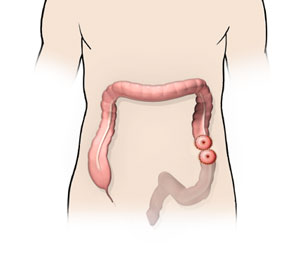Colostomy

What is a Colostomy?
A colostomy is a surgically created opening in the abdomen in which a section of the large intestine (colon or large bowel) is brought out of the abdominal wall to form a stoma through which digestive waste or faeces pass into an externally worn pouch. A colostomy is done when a section of the large intestine or rectum is removed as a result of damage or a disease process.
A colostomy can be permanent or temporary. A permanent colostomy may be needed when a medical condition affects the end portion of the large intestine or rectum. A temporary colostomy may be needed to give a part of the colon time to rest and heal. After healing has taken place, the colostomy is reversed, and normal bowel function is restored.
Indications for Colostomy
Your surgeon may recommend a colostomy as a treatment for problems of the colon or rectum such as:
- Injury to the rectum or colon
- Bowel or intestinal blockage
- Colon or rectal cancer
- Hirschsprung’s disease
- Ulcerative colitis
- Crohn’s disease
- Imperforate anus or other congenital defects
- Colonic polyps
- Irritable bowel syndrome
Preparation for Colostomy Surgery
Pre-procedure preparation for colostomy generally involves the following steps:
- A thorough examination is performed by your doctor to check for any medical issues that need to be addressed prior to surgery.
- Depending on your medical history, social history, and age, you may need to undergo tests such as blood work and imaging to help detect any abnormalities that could threaten the safety of the procedure.
- You will be asked if you have allergies to medications, anaesthesia, or latex.
- You should inform your doctor of any medications, vitamins, or supplements that you are taking.
- You may need to refrain from supplements and medications such as blood thinners or anti-inflammatories for a week or two prior to surgery.
- You should not consume any solids or liquids at least 8 hours prior to surgery.
- You will be placed on a special diet prior to surgery and laxatives may be used to clean out your bowel.
- You will be instructed to shower with an antibacterial soap the night prior to surgery to help lower your risk of infection after surgery.
- Arrange for someone to drive you home after surgery.
- A written consent will be obtained from you after the surgical procedure has been explained in detail.
Procedure for Colostomy Surgery
Colostomy surgery is usually performed under general anaesthesia after bowel resection and involves the following steps:
- You will lie on your back on the operating table with an intravenous (IV) line placed in your arm.
- Fluids, medications, and anaesthesia are administered through IV access to keep you calm and comfortable throughout the procedure.
- The surgical site is cleaned and prepared and your surgeon makes either a long incision for open surgery or a series of smaller incisions for a minimally invasive laparoscopic procedure in which a laparoscope (a thin, flexible, fibre-optic lighted instrument with a camera) and miniature surgical instruments are inserted to carry out the required repair.
- During a colostomy, your surgeon will choose the ideal portion of the colon for the creation of the stoma.
- Your surgeon will then cut the colon at the correct region and bring it through the abdominal wall.
- A ring is then implanted surgically onto the abdominal wall, which helps to hold the end of the colon in place. This ring may be placed temporarily to assist with the healing of your skin around the exposed colon or as a permanent fixture.
- After everything is in place, the incisions are closed with stitches and the stoma site is connected to an appropriate pouch for collection of digestive waste and disposal accordingly.
Postoperative Care and Recovery
In general, postoperative care instructions and recovery after colostomy surgery will involve the following steps:
- You will be transferred to the recovery area where your nurse will closely observe you for any allergic/anaesthetic reactions and monitor your vital signs as you recover.
- Based on your condition and the type of colostomy performed, you may need to stay in the hospital for a few days.
- You may experience pain, inflammation, and discomfort in the operated area. Pain and anti-inflammatory medications are provided as needed.
- Antibiotics are also prescribed to address the risk of surgery-related infection.
- Walking and moving around in bed is strongly encouraged as it lowers the risk of blood clots and pneumonia. It also helps to stimulate your bowels and assist with passing gas.
- Your diet is slowly advanced after surgery. You will start with clear liquids, then pureed diet, and slowly progress to having normal solid foods, as tolerated.
- It is important to keep the surgical site clean and dry. Instructions on surgical site care, stoma care, stool collecting bag/pouch, and bathing will be provided.
- Refrain from strenuous activities and lifting anything heavier than 5 pounds for the first couple of months or until your first follow-up visit. A gradual increase of activities over a period of time is recommended.
- Eating a healthy low-fat, high-fibre diet and drinking 8 to 10 glasses of water daily is recommended to prevent constipation and for softer stools.
- Walking is a good exercise and is strongly recommended to improve your endurance.
- You will be able to resume your normal activities within a couple of weeks but may have certain activity restrictions.
- A periodic follow-up appointment will be scheduled to monitor your progress.
Risks and Complications of Colostomy Surgery
A colostomy is a relatively safe procedure; however, as with any surgery, some risks and complications may occur, such as:
- Damage or injury to adjacent organs
- Bleeding
- Infection
- Hernia
- Prolapse of colostomy
- Intestinal blockage from scar tissue
- Skin irritation
- Opening of the wound








